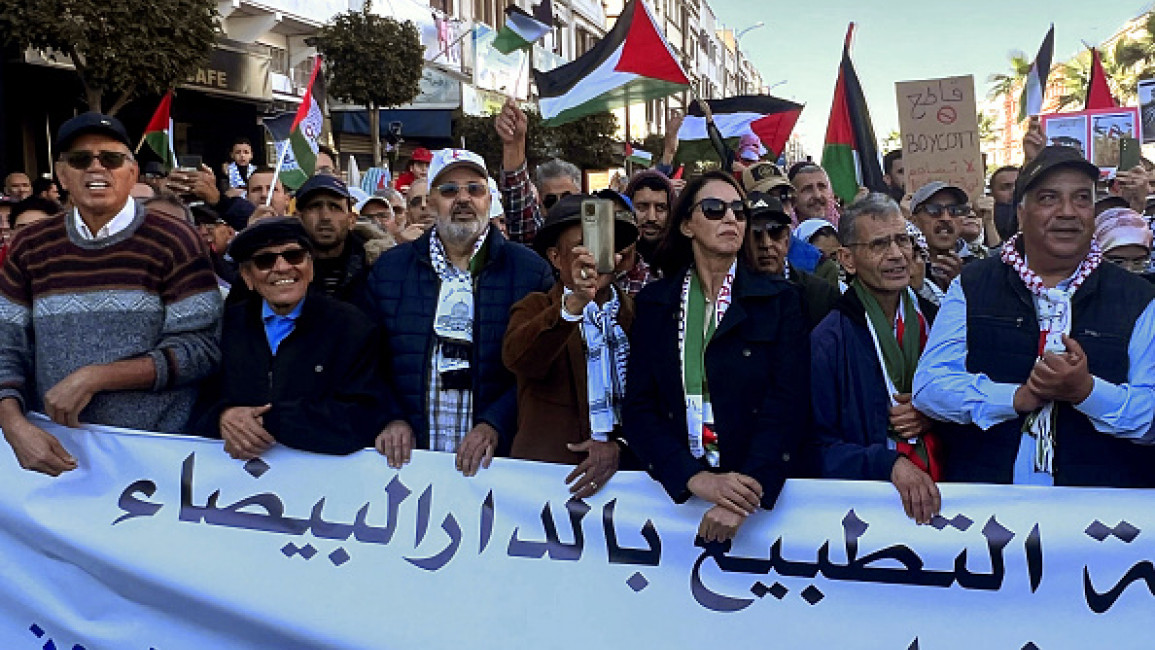ICJ ruling is Morocco's opportunity to revoke normalisation: BDS Maroc
The International Justice Court's (ICJ) ruling on Israel's genocide case is Morocco's opportunity to revoke normalisation with Israel effective immediately, stated BDS Maroc, a burgeoning pro-Palestine boycott group in the North African kingdom.
"It's an opportunity to revoke all agreements with the Zionist entity, namely the military ones," added the local group on Sunday, 28 January.
Rabat and Tel Aviv normalised ties late in 2020. Since then, the two states have heavily focused on military cooperation despite social opposition.
In November 2021, then-defence minister Benny Gantz signed a memorandum of understanding with his Moroccan counterpart, the first such agreement between Israel and a Middle East and North African state.
Last June, the IDF sent a delegation of troops to participate in a major US-led military drill held in Morocco, a first for the Israeli army.
A month later, Israel Defense Forces appointed a first military attaché to Morocco.
Also, the Israeli defence contractor Elbit Systems is set to open two manufacturing sites in the North African country, according to the head of the Israeli Liaison Office in Morocco.
Since last October, Rabat-based Israeli diplomats have not discussed further the project as they flew back to Tel Aviv "for security reasons."
Morocco's official position on ICJ's ruling
On Saturday, 27 January, an anonymous source from Rabat's Foreign Ministry "welcomed the decision of the ICJ regarding immediate provisional measures that Israel must take to ensure the protection of Palestinians in the Gaza Strip and to guarantee humanitarian aid in a sufficient and unimpeded manner."
The source was quoted by the state news agency Maghreb Arab Press (MAP). It did not mention the term "genocide". In its decision, ICJ said it's 'plausible' Israel committed genocide in Gaza.
This is the closest Rabat has come to an official statement against Israel's genocide in Gaza since 7 October.
Morocco's Ministry of Foreign Affairs has yet to share an official statement on its website vis-à-vis the ICJ's ruling.
Over the past months, Rabat has condemned violence on both sides. As a member of the Organisation of Islamic Cooperation (OIC), it also took part in the OIC's statement urging the international community "to shoulder its responsibilities and provide protection for the Palestinian people."
Taking Israeli leaders in Morocco to trial
Following the ICJ's ruling, the opposition Party of Socialism and Progress (PPS) urged for "holding accountable the Zionist leaders before national courts."
Since early 2000, local activists opposing normalisation have submitted multiple complaints in Moroccan courts accusing Israeli leaders of Moroccan origin, namely Amir Peretz, the former Israeli Minister of Defense, and General Samy Tordjman, the former chief of the Israeli war in Gaza in 2014, with charges of genocide.
Last December, a member of the Al-Istiqlal party – one of the three political parties in the Moroccan coalition government – called on the Moroccan king Mohammed VI to strip Israeli-Moroccans of their North African citizenship over "their contribution to war crimes."
While there's no official data on Israelis who hold Moroccan citizenship, Moroccan Jews and Jews of Moroccan ancestry make up around 1 million out of Israel's total population of 9.1 million in 2020.



